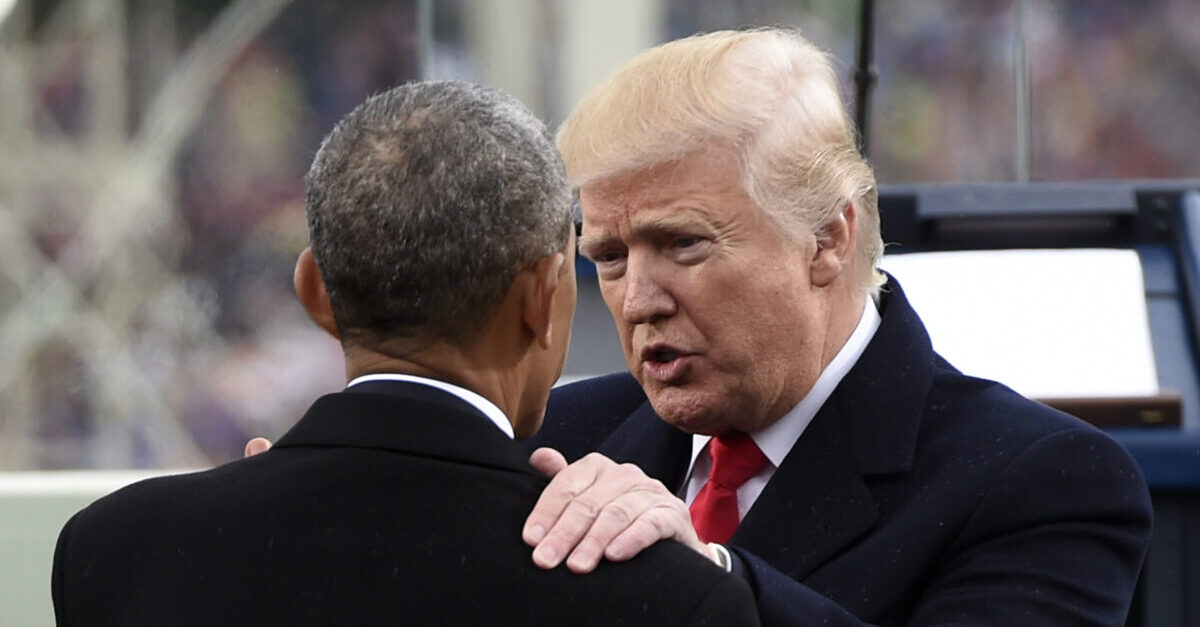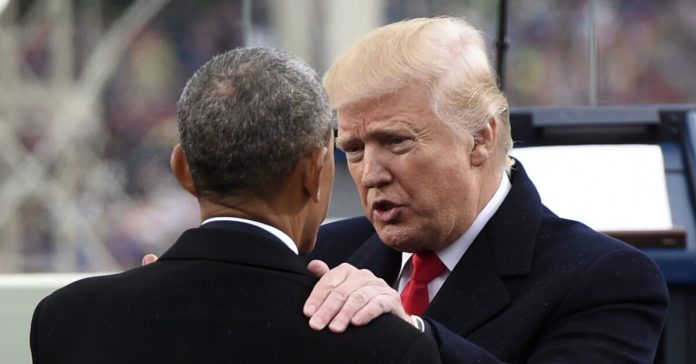
Donald Trump and Barack Obama on on January 20, 2017 (Photo by Saul Loeb – Pool/Getty Images)
Lawyers for Donald Trump were abundantly clear on Wednesday in a filing at the U.S. Court of Appeals for the D.C. Circuit that they view special counsel Jack Smith as a “Grinch” who is trying to ruin their Christmases by trying to expedite review of the former president’s “immunity” arguments in his Jan. 6 criminal case.
The opposition filed by the Trump team comes two days after the special counsel filed a petition for a writ of certiorari before judgment in the U.S. Supreme Court and, at the same time, filed a “motion to expedite proceedings in the D.C. Circuit” in the event that SCOTUS did not ultimately decide to grant the petition.
In the SCOTUS petition, Smith said that he wants the Trump immunity claims to be “resolved as expeditiously as possible” so that the Jan. 6 trial date currently set for March 4 doesn’t have to be pushed back. Trump lawyers countered by accusing the special counsel of having the lone “goal” of “unlawfully attempt[ing] to try, convict, and sentence President Trump before an election in which he is likely to defeat President Biden.”
The lawyers who had earlier pushed for Trump’s gag order appeal to be immediately resolved are now arguing that Trump’s immunity claims are so weighty that “careful and deliberate consideration of these momentous issues with the utmost care and diligence” is what is warranted, not Jack Smith’s “rushed schedule.”

Special counsel Jack Smith arrives to speak about an indictment of former President Donald Trump, Aug. 1, 2023, at a Department of Justice office in Washington. (AP Photo/Jacquelyn Martin, File)
“The question whether a President is immune from criminal prosecution for his official duties is a novel question of exceptional sensitivity and importance — one that warrants careful and deliberate treatment, not a hyper-accelerated briefing schedule and rush to judgment driven by partisan concerns,” the opposition said, before wondering whether former Presidents George W. Bush, Barack Obama, Richard Nixon, and John Quincy Adams could have been prosecuted:
Could President George W. Bush face criminal charges of defrauding the United States and obstructing official proceedings for allegedly giving Congress false information about weapons of mass destruction in Iraq, to induce war on false premises? Could President Obama be charged with murder for allegedly authorizing the drone strike that killed Anwar Al-Awlaki and his sixteen-year-old son, both U.S. citizens? Could President Nixon have been prosecuted for obstruction of justice for ordering the dismissal of Archibald Cox in the “Saturday Night Massacre”? Could President John Quincy Adams have been indicted and imprisoned for the “corrupt bargain” of appointing Henry Clay as his Secretary of State? According to President Trump, the answer to these questions is “No,” an answer that is deeply rooted in the doctrine of separated powers — but the prosecution disagrees. These are questions of historic sensitivity and importance. They warrant the most careful consideration possible, not the breakneck speed demanded by the prosecution.
If the special counsel’s “rushed schedule” were to be accepted, then Smith would be like Dr. Suess’ “The Grinch” character scheming on how to ruin Trump lawyers’ Christmases, the filing said:
Even if the Court grants expedited consideration — which it should not do — it should not adopt the prosecution’s proposed schedule, which is facially unreasonable. The prosecution “requests that the Court require the defendant’s opening brief be due no later than ten days from the entry of a briefing order,” Mot. 5-6 — which, assuming the Court rules promptly on the motion to expedite after the close of briefing, would make President Trump’s opening brief due the day after Christmas. This proposed schedule would require attorneys and support staff to work round-the-clock through the holidays, inevitably disrupting family and travel plans. It is as if the Special Counsel “growled, with his Grinch fingers nervously drumming, ‘I must find some way to keep Christmas from coming. … But how?’” DR. SEUSS, HOW THE GRINCH STOLE CHRISTMAS (Random House 1957).
The Trump team pushed instead for “40 days to serve and file [Trump’s] initial brief after the record is filed, Fed. R. App. P. 31(a)(1), 21 days to file a reply brief, and 45 days to prepare for oral argument.”
“The Court should grant no less than fourteen days for a proper reply brief and 21 days to prepare for oral argument on these momentous issues, even if it expedites the appeal,” Trump lawyers said. “Anything less would result in a heedless rush to judgment on some of the most sensitive and important issues that this Court may ever decide.”
Have a tip we should know? [email protected]

